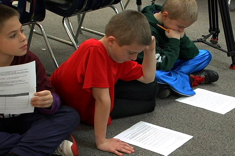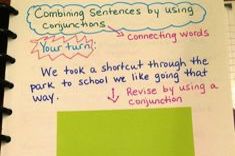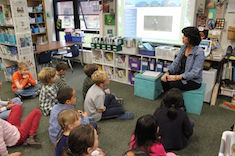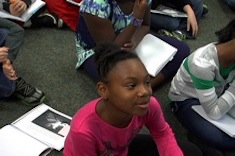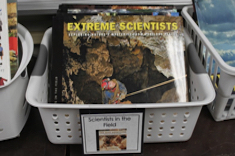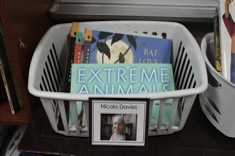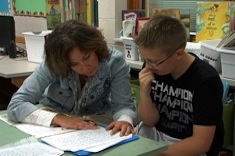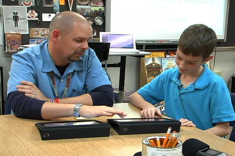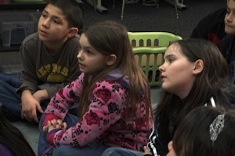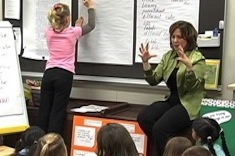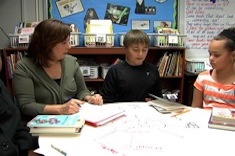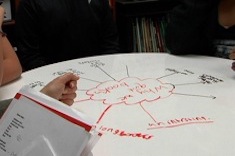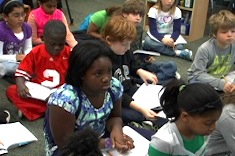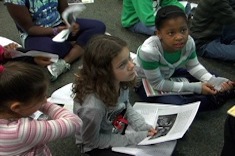4th
Latest Content
“Article of the Week” Activity in Fourth Grade
Tony Keefer finds that the article-of-the-week activity (adapted from Kelly Gallagher's work) is a good way to integrate short shared texts into his fourth-grade literacy workshop.
Making the Most of Short Texts
Mary Lee Hahn melds short texts with the Common Core in this first article in a two-part series.
Children’s Literature for the Olympics
The Olympics are just around the corner, and Sarah Klim has suggestions for read alouds in a new booklist.
Explanatory Grammar Moves: Getting Verbal with It
Jeff Anderson concludes his series on explanatory grammar moves by exploring participles, included in the Common Core eighth-grade standard covering the use of verbals.
Jennifer Serravallo on Formative Assessment (PODCAST)
Franki Sibberson chats with Jennifer Serravallo about formative assessment in this podcast. Jennifer is the author of The Literacy Teacher’s Playbook, Grades 3-6: Four Steps for Turning Assessment Data into Goal-Directed Instruction.
Formative Spelling Assessment
Max Brand has developed templates for grades K-2 and 3-5 to use for formative spelling assessments.
Whole Class Research Planning in 4th Grade
Andrea Smith’s fourth graders brainstorm next steps for their research project on owl habitats, which includes writing a research proposal.
Keep Going
Ruth Ayres has advice for moving forward, staying positive, and focusing on what’s important.
Rethinking Nonfiction Topic-Based Text Sets
Franki Sibberson concludes her series on redesigning nonfiction sections of classroom libraries in the age of the Common Core.
Rethinking Nonfiction Series Books
Franki Sibberson explains how she features nonfiction series books in her classroom library.
Rethinking Nonfiction Author Baskets
Franki Sibberson realizes she needs to highlight nonfiction authors in new ways in her classroom library.
Explanatory Grammar Moves: Right-Branching Sentences
Jeff Anderson continues his Explanatory Grammar Series with a feature on the power of right-branching sentences.
Spelling Cycles: An Alternative to Weekly Spelling Lists
Max Brand developed Spelling Cycles as an alternative to weekly spelling tests. He explains how they work with an example from a third-grade class.
Curating a Nonfiction Classroom Library
Franki Sibberson writes about how her thinking about nonfiction is changing her classroom library in this first installment of a four-part series.
Powerful Conferences
Ruth Ayres explains how deciding the purpose of conferring in advance can lead to more powerful conferences.
Writing a Strong Ending: 4th Grade Writing Conference
Tony Keefer confers with fourth grader Tommy to help him write a stronger ending.
Reporting and Crafting: Conferring with Ezra
Ruth Ayres confers with Ezra about revision — using a mentor text to help him move from reporting to crafting in his writing.
Kindle Highlights: Conferring with Nicole
If you’ve ever used a Kindle reader, you might be fascinated by the highlighted notes of other readers. Franki Sibberson uses those notes in a conference with Nicole.
Finding a Writing Buddy
Beth Lawson helps her fourth graders sort through what makes peer collaboration work during writing buddy time.
Two Lessons for Teaching Theme
Franki Sibberson writes about how she chooses books for theme instruction and shares two lessons.
Strong Girls Book Group
Franki Sibberson shares a range of books that include compelling female characters with a group of fourth-grade girls.
She Wants to Be Katniss for Halloween: Courageous Girls in Books
Shari Frost celebrates a tomboy who finally finds a female character she wants to emulate with a booklist highlighting courageous girls.
Exploring Explanatory Moves Writers Use
Jeff Anderson explores the difference between informational and explanatory writing, and what that might mean for teaching craft moves to students.
Research Book Clubs for Struggling Readers
Beth Lawson finds that a nonfiction research book club is just the grouping structure needed for a group of struggling readers in her fourth-grade classroom.
Building Stamina and Book Choice Skills
Franki Sibberson continues a discussion with a small group of students who often abandon books. This is the second installment in a two-part video series.
Abandoning Books Discussion
Franki Sibberson works with a small group of fourth graders who often abandon books.
Whole-Class Research Planning
Andrea Smith leads her fourth graders through brainstorming for their owl research project.
Keeping Kids Safe on the Internet
Julie Johnson provides helpful tips and a letter for parents to help keep students safe on the Internet.
Emphasizing Empathy: September Literacy Contracts
Megan Ginther and Holly Mueller are Emphasizing Empathy in their September literacy contracts for middle school students.
Owl Research: Whole Class Explanation of Marking Up Text
Students are given a nonfiction text to mark up during a close reading with a partner in this video from Andrea Smith’s fourth-grade classroom.
Browse Content By
Type
Category
- Assessment Tools
- Big Fresh Archives
- Booklists
- Choice Numeracy
- Classroom Design
- Common Core
- Community Building
- Conferring
- Content Literacy
- Digital Literacy
- English Language Learners
- Equity
- Family Relations
- Free Samples
- Guiding Groups
- Leadership
- Literacy Coaches
- Mentor Texts
- Minilessons
- New Teacher Mentors
- Podcasts
- Poetry
- Quote Collections
- Reading Strategies
- Self Care
- Struggling and Striving Learners
- Talking and Listening
- Teacher Study Groups
- Teaching Reading
- Teaching Writing
- Word Study and Vocabulary
Author
- Melissa Quimby
- Nawal Qarooni
- Gwen Blumberg
- Julie Cox
- The Lead Learners
- Hannah Tills
- Josie Stewart
- Ruth Metcalfe
- Mallory Messenger
- Becca Burk
- Jodie Bailey
- Vivian Chen
- Mary Brower
- Tiffany Abbott Fuller
- Stephanie Affinito
- Ruth Ayres
- Leigh Anne Eck
- Heather Fisher
- Shari Frost
- Julie Johnson
- Suzy Kaback
- Gigi McAllister
- Shirl McPhillips
- Melanie Meehan
- Cathy Mere
- Debbie Miller
- Tara Barnett and Kate Mills
- Tammy Mulligan
- Dana Murphy
- Bitsy Parks
- David Pittman
- Brenda Power
- Heather Rader
- Matt Renwick
- Mandy Robek
- Christy Rush-Levine
- Gretchen Schroeder
- Jen Schwanke
- Brian Sepe
- Katherine Sokolowski
- Stella Villalba
- Jennifer Vincent
Grade Level
Choice Literacy Membership
Articles
Get full access to all Choice Literacy article content
Videos
Get full access to all Choice Literacy video content
Courses
Access Choice Literacy course curriculum and training

